My Wood--E.M. Forster 文章分析
- 格式:ppt
- 大小:675.00 KB
- 文档页数:15
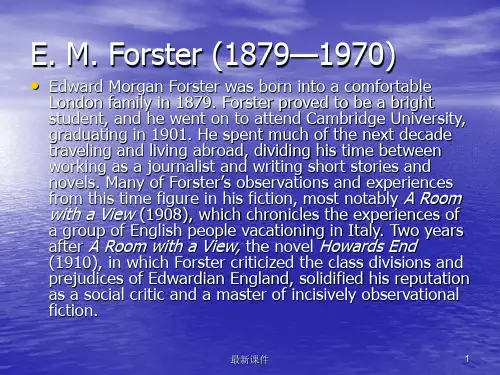
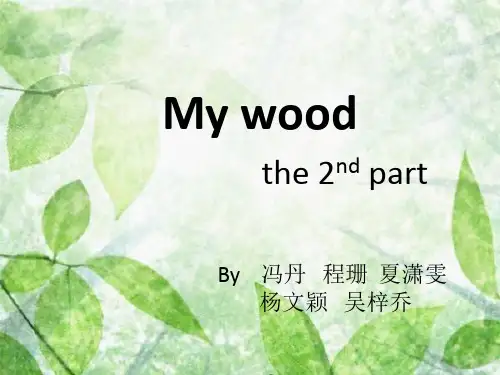
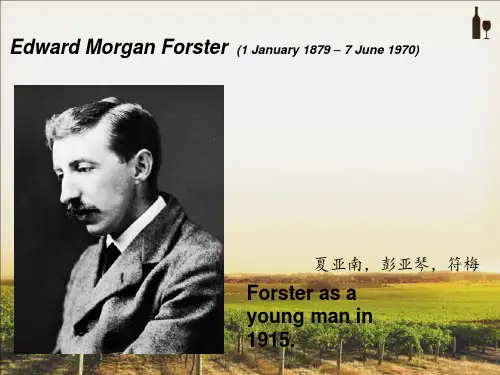
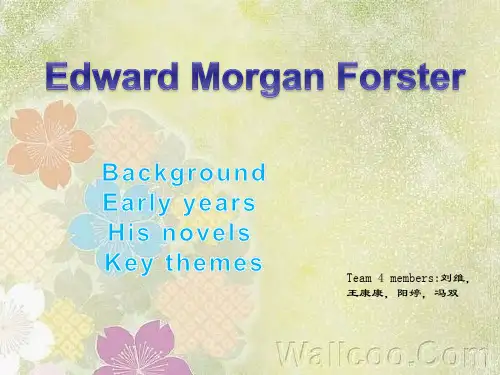
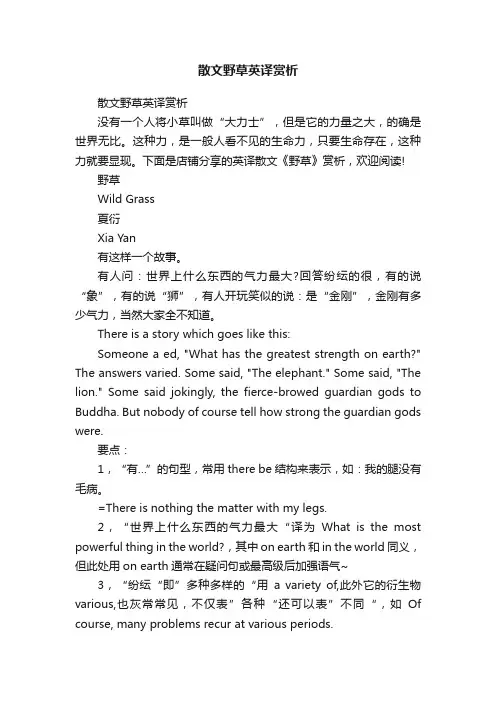
散文野草英译赏析散文野草英译赏析没有一个人将小草叫做“大力士”,但是它的力量之大,的确是世界无比。
这种力,是一般人看不见的生命力,只要生命存在,这种力就要显现。
下面是店铺分享的英译散文《野草》赏析,欢迎阅读!野草Wild Grass夏衍Xia Yan有这样一个故事。
有人问:世界上什么东西的气力最大?回答纷纭的很,有的说“象”,有的说“狮”,有人开玩笑似的说:是“金刚”,金刚有多少气力,当然大家全不知道。
There is a story which goes like this:Someone a ed, "What has the greatest strength on earth?" The answers varied. Some said, "The elephant." Some said, "The lion." Some said jokingly, the fierce-browed guardian gods to Buddha. But nobody of course tell how strong the guardian gods were.要点:1,“有…”的句型,常用there be 结构来表示,如:我的腿没有毛病。
=There is nothing the matter with my legs.2,“世界上什么东西的气力最大“译为What is the most powerful thing in the world?,其中on earth和in the world同义,但此处用on earth通常在疑问句或最高级后加强语气~3,“纷纭“即”多种多样的“用a variety of,此外它的衍生物various,也灰常常见,不仅表”各种“还可以表”不同“,如Of course, many problems recur at various periods.当然,有许多问题会在不同的时期反复提出。
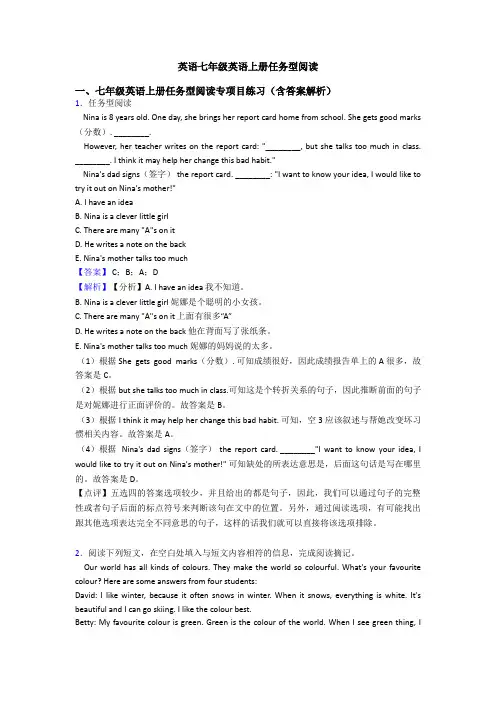
英语七年级英语上册任务型阅读一、七年级英语上册任务型阅读专项目练习(含答案解析)1.任务型阅读Nina is 8 years old. One day, she brings her report card home from school. She gets good marks (分数). ________.However, her teacher writes on the report card: "________, but she talks too much in class. ________. I think it may help her change this bad habit."Nina's dad signs(签字) the report card. ________: "I want to know your idea, I would like to try it out on Nina's mother!"A. I have an ideaB. Nina is a clever little girlC. There are many "A"s on itD. He writes a note on the backE. Nina's mother talks too much【答案】 C;B;A;D【解析】【分析】A. I have an idea 我不知道。
B. Nina is a clever little girl 妮娜是个聪明的小女孩。
C. There are many "A"s on it 上面有很多“A”D. He writes a note on the back 他在背面写了张纸条。
E. Nina's mother talks too much 妮娜的妈妈说的太多。
My WoodE. M. ForsterEdward Morgan Forster (1879-1970), English essayist, novelist, biographer, and literary critic, wrote several notable works of fiction dealing with the constricting effects of social and national conventions upon human relationships. These novels include A Room with a View(1908), Howards End(1910), and A Passage to India (1924). In addition, his lectures on fiction, collected as Aspects of the Novel (1927), remain graceful elucidations of the genre. In “My Wood” taken from his essay collection Abinger Harvest(1936), Forster writes with wit and wisdom about effect of property upon human behavior---notably his own.A few years ago I wrote a book which dealt with in part with the difficulties of the English in India. Feeling that they would have had no difficulties in India themselves, Americans read the book freely. The more they read it the better it made them feel, and a cheque to the author was the result. I bought a wood with the cheque. It is not a large wood----it contains scarcely any trees, and it is intersected, blast it by a public footpath. Still, it is the first property that I have owned, so it is right that other people should participate in my shame, and should ask themselves, in accents that will vary in horror, this very important question: What is the effect upon the character? Don’t let’s touch the economics; the effect of private ownership upon the community as a whole is another question----a more important question, perhaps, but another one. Let’s keep to psychology.If you own things, what’s their effect on you? What’s the effect on me of my wood?In the first place, it makes me feel heavy. Property does have this effect. Property produces men of weight, and it was a man of weight who failed to get into the Kingdom of Heaven. He was not wicked, that unfortunate millionaire in the parable, he was only stout; he stuck out in front, not to mention behind, and as he wedged himself this way and that in the crystalline entrance and bruised his well-fed flanks, he saw beneath him a comparatively slim camel passing through the eye of a needle and being woven into the robe of God. The Gospels all through couple stoutness and slowness. They point out what is perfectly obvious, yet seldom realized: that if you have a lot of things you cannot move about a lot, that furniture requires dusting, dusters require servants, servants require insurance stamps, and the whole tangle of them makes you think twice before you accept an invitation to dinner or go for a bathe in the Jordan. Sometimes the Gospels proceed further and say with Tolstoy that property is sinful; they approach the difficult ground of asceticism here, where I cannot follow them. But as to the immediate effects of property on people, they just show straightforward logic. It produces men of weight. Men of weight cannot, by definition, move like the lightning from the East unto the West, and the ascent of a fourteen-stone bishop into a pulpit is thus the exact antithesis of the coming of the Son of Man. My wood makes me feel heavy.In the second place, it makes me feel it ought to be larger.The other day I heard a twig snap in it. I was annoyed at first, for I thought that someone was blackberrying, and depreciating the value of the undergrowth. On coming nearer, I saw it was not a man who had trodden on the twig and snapped it, but a bird, and I felt pleased. My bird. The bird was not equally pleased. Ignoring the relation between us, it took fright as soon as it saw the shape of my face, and flew straight over the boundary h edge into field, the property of Mrs. Henessy’s bird. Something seemed grossly amiss here, something that would not have occurred had the wood been larger. I could not afford to buy Mrs. Henessy out, I dared not murder her, and limitations of this sort beset me on every side. Ahab did not want that vineyard---he only needed it to round off his property, preparatory to plotting a new curve---and all the land around my wood has become necessary to me in order to round off the wood. A boundary protects. But ----poor little things---the boundary in its turn to be protected. Noises on the edge of it. Children throw stones. A little more, and then a little more, until we reach the sea. Happy Canute! Happier Alexander! And after all, why should even the world be the limit of possession? A rocket containing a Union Jack, will, it is hoped, be shortly fired at the moon. Mars Sirius. Beyond which…But these immensities ended by saddening me. I could not suppose that my wood was destined nucleus of universal dominion---it is so very small and contains no mineral wealth beyond the blackberries. Nor was I comforted when Mrs. Henessy’s bird took alarm for the second time and flew clean away from us all, under the belief that it belonged to itself.In the third place, property makes its owner feel that he ought to do something to it. Yet he isn’t sure what. A restlessness comes over him, a vague sense that he has a personality to express---the same sense which, without any vagueness, leads the artist to an act of creation. Sometimes I think I will cut down such trees as remain in the wood, at other times I want to fill up the gaps between them with new trees. Both impulses are pretentious and empty. They are not honest movements towards money-making or beauty. They spring from a foolish desire to express myself and from an inability to enjoy what I have got. Creation, property, enjoyment form a sinister trinity in the human mind. Creation and enjoyment are both very, very good, yet they are often unattainable without a material basis, and at such moments property pushes itself in as a substitute, saying, “Accept me instead---I’m good enough for all three.” It is not enough. It is, as Shakespeare said of lust, “The expense or spirit in a waste of shame”: it is “Before, a joy proposed; behind, a dream.” Yet we don’t know how to shun it. It is forced on us by our economic system as the alternative to starvation. It is also forced on us by an internal defect in the soul, by the feeling that in property may lie the germs of self-development and of exquisite or heroic deeds. Our life on earth is, and ought to be, material and carnal! But we have not yet learned to manage our materialism and carnality properly; they are still entangled with the desire for ownership, where (in the words of Dante) “Possession is one with loss.”And this brings us to our fourth and final point: the blackberries.Blackberries are not plentiful in this meager grove, but they are easily seen from the public footpath which traverses it, and all too easily gathered. Foxgroves, too---people pull up the foxgroves, and ladies of an educational tendency even grubfor toadstools to show them on the Monday in class. Other ladies, less educated, roll down the bracken in the arms of their gentlemen friends. There is paper, there are tins. Pray, does my wood belong to me or doesn’t it? And, if it does, should I not own it best by allowing no one else to walk there? There is a wood near Lyme Regis, also cursed by a public footpath, where the owner has not hesitated on this point. He has built high stone walls each side of the path, and has spanned it by bridges, so that the public circulate like termites while he gorges on the blackberries unseen. He really does own his wood, this able chap. Dives in Hell did pretty well, but the gulf dividing him from lazarus could be travesed by vision, and nothing traverses it here. And perhaps I shall come to this in time. I shall wall in and fence out until I really taste the sweets of property. Enormously stout, endlessly avaricious, pseudo-creative, intensely selfish, I shall weave upon my forehead the quadruple crown of possession until those nasty Bolshies come and take it off again and thrust me aside into the outer darkness.。
基于彼得.纽马克关联法的刘世聪《落花生》英译本赏析摘要:我国著名作家许地山先生的《落花生》是一篇脍炙人口的经典散文,其语言平实,故事情节娓娓道来,主题鲜明深刻。
该作品自问世以来,不仅深受广大国内读者的喜爱与好评,也被翻译成多个英语版本在国外广为流传。
在各个译本中,刘世聪所译版本在词汇,语法,语篇上与原文贴近程度高,在传情达意上颇为成功,是汉英散文翻译的典范。
本文将基于彼得.纽马克的关联法从词汇,语法和语篇三个角度对《落花生》进行赏析。
关键词:落花生;关联法;词汇;语法;语篇介绍许地山先生的名作《落花生》采用口语化的语言,讲述了作者小时候一件关于花生的故事,通过花生揭示了深刻的人生道理。
文中朴素的语言所营造的温馨和睦的家庭氛围,揭示出的深刻的人生哲理是广大读者终身受用的。
翻译《落花生》关键是要译出原文朴素自然地语言风格,并流畅自然地引出原文发人深省的道理。
刘世聪先生因其对英汉两种语言的熟练掌握和深厚的文学功底,翻译的《落花生》无论从词汇,语法还是语篇衔接层面看,都成功地做到了与原文的贴近,是一篇汉英散文翻译的典范之作。
关联法是由英国当代著名翻译家,翻译理论家彼得.纽马克提出的。
纽马克最著名的翻译理论是语义翻译和交际翻译,但这种二分法的翻译理论在实践中被证明是太过抽象概括,因为任何翻译都是从字词句着手的,而上述理论似乎走得太远。
所以他综合语义翻译和交际翻译,提出了关联翻译法。
纽马克对关联法的基本定义:原作或译语文本的语言越重要,就越要紧贴原文翻译(the more import ant the langua ge of the origin al or source langua ge text, the more closel y it should be transl ated).他对重要的界定是指语言表示出“特别有价值、特别有意义、特别必须、或永恒”的事物(New mark, 1991:2)。